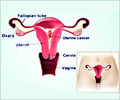Epigenetic modification of the HAND2 gene plays a critical role in the development of endometrial cancer, suggests a new study published this week in PLOS Medicine.

The researchers found that HAND2 methylation is already increased in premalignant endometrial lesions (cancer-prone, abnormal-looking tissue) compared to normal endometrium, and that a high level of methylation predicted a poor response to progesterone treatment (which stops the growth of some pre-cancerous endometrial lesions).
Moreover, analysis of HAND2 methylation in endometrial secretions collected from women with postmenopausal bleeding (which can be a symptom of endometrial cancer) accurately identified individuals with early stage cancer. Finally, mice in which the Hand2 gene was specifically deleted in the endometrium developed precancerous endometrial lesions with age. Widschwendter, who led the study, said: "Our work provides clear evidence that it is not only genetic alterations which trigger and lead to cancer but that epigenetic alteration can also be the initiating step." Endometrial cancer is the most common gynecological cancer, and its incidence is continuing to rise in an older and more obese population. The authors suggest that HAND2 methylation "could be applied to triage women who present with postmenopausal bleeding (currently ~90% of women who present with this symptom and are cancer-free must undergo endometrial biopsy for a definitive diagnosis) and could be further employed as a test to early detect or even predict the risk for endometrial cancer and response to preventative treatment".
Source-Eurekalert















